Can chickens eat marigolds? The short answer is yes; chickens can eat marigolds. Marigolds are not poisonous to chickens and may even have some health benefits.
Marigolds contain compounds that can help keep away insects and parasites and antioxidants that can boost a chicken’s immune system. However, as with anything else, moderation is key. Too many marigolds can cause digestive issues in chickens, so it’s important to only give them a few at once.
This article will give you more information on whether or not chickens can eat marigolds, as well as tips on how to incorporate them into your chicken’s diet.
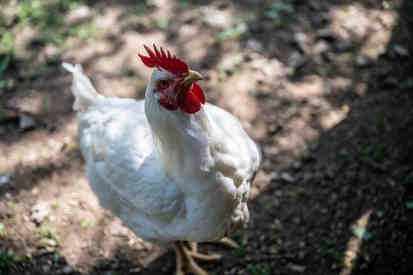
What are marigolds?
Marigolds are a type of flower that belongs to the Asteraceae family. They are native to North America and come in various colors, including yellow, orange, and red.
Marigolds contain high levels of beta-carotene, a pigment that gives them their bright color. Beta-carotene is converted into vitamin A in the body, essential for good vision, immunity, and fertility in chickens.
Marigolds also contain lutein, which is important for healthy eyesight.
[ChickenAffiliate]
Can chickens eat marigolds?
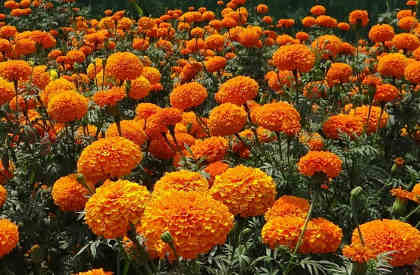
Yes, Chickens can eat marigolds. Marigolds are a great source of vitamins and minerals for chickens. Marigolds contain carotenoids, which help to boost a chicken’s immune system and give them beautiful yellow-orange plumage.
Marigolds also contain lutein, which is good for a chicken’s eyesight. Additionally, marigolds are a good source of fiber, which helps to keep a chicken’s digestive system healthy.
So, if you’re looking for a way to add some variety to your chicken’s diet, or if you’re looking for a way to give them an extra boost of vitamins and minerals, then adding marigolds to their diet is a great idea.
The benefits of eating marigolds for chickens
Marigolds are a great option for chickens because they are nutritious and can help alleviate some common health problems. Keep reading to learn more about the benefits of marigolds for chickens.
Full of nutrients
Marigolds are a good source of vitamins A, C, and E, as well as beta-carotene and lutein. These nutrients are important for chicken health because they support the immune system, vision, and skin health.
Can help alleviate health problems
Marigolds have anti-inflammatory and antibacterial properties, which can help relieve respiratory problems, dermatitis, and intestinal infections. Chickens that eat marigolds also tend to have fewer parasites.
Can improve egg production
The lutein in marigolds can increase egg production in hens by up to 25%. If you’re looking for a way to increase egg production without commercial feed, then feeding your chickens marigolds is a great option.
Help improve the flavor of eggs
Chickens that eat marigolds lay eggs that have a richer flavor. If you’re looking for a way to make your eggs taste even better, then feeding your chickens marigolds is a great way to do it. The eggs will also have a brighter yellow yolk.
Can help improve your chicken’s immune system
The antioxidants in marigolds can help improve your chicken’s immune system. This is especially important if you live in an area with many pests and parasites, as the extra boost to the immune system can help keep your chickens healthy.
Can help repel parasites and insects
The compounds in marigolds can help repel parasites and insects. This can help to keep your chickens healthy and free from pests.
Things to watch out for when feeding marigolds to chickens
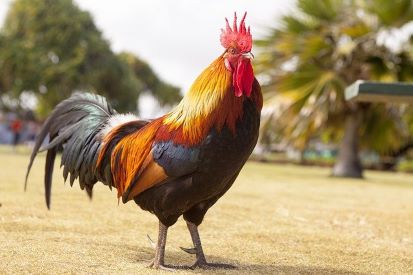
Marigolds are a popular choice for chicken owners looking to add some color and variety to their flock’s diet. However, there are a few things you need to keep in mind when feeding marigolds to chickens.
Make sure the marigolds are pesticide-free
Chickens are very sensitive to pesticides and other chemicals, so it’s important to ensure the marigolds you’re feeding them are free of harmful chemicals. You can either grow your marigolds or purchase them from a reputable source.
Only feed fresh marigolds to your chickens
Marigolds begin to lose their nutritional value as soon as they’re picked, so it’s important only to feed fresh marigolds to your chickens. If you can’t find fresh marigolds, you can also feed dried or frozen ones.
Watch out for marigold allergies in chickens
Just like people, some chickens may be allergic to marigolds. Watch for signs of an allergic reaction, such as excessive sneezing, watery eyes, or difficulty breathing, and discontinue feeding the marigolds if you see any of these signs.
Don’t feed them too many
While marigolds are a great source of nutrients for chickens, it’s important not to overdo it. Feeding your chickens too many marigolds can cause digestive problems. Stick to feeding them a small handful of fresh or dried marigolds daily.
Generally, marigolds are a safe and healthy option for chickens. However, before feeding them to your flock, it’s important to be aware of the potential risks.
How often should chickens eat marigolds?
There is no hard and fast rule, but a good general guideline is to offer them marigolds 2-3 times per week. You can offer them fresh marigolds, dried marigolds, or even marigold petals.
If you’re growing your marigolds, you can let your chicken free range in your garden and let them nibble on the flowers as they please. Make sure the flowers haven’t been treated with pesticides or chemicals before you offer them to your chicken.
How to prepare marigolds for feeding to chickens
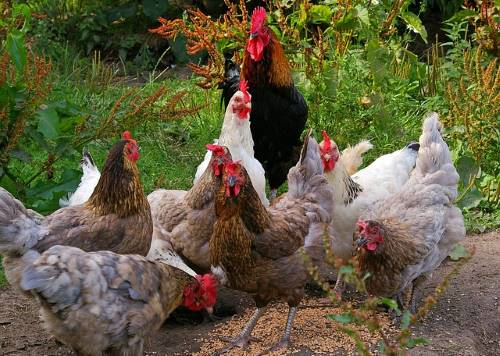
If you’re thinking about adding marigolds to your chicken’s diet, here’s what you need to know about how to prepare them.
The first step is to harvest the marigolds. Cut the stems close to the ground, careful not to damage the roots. You can either harvest the entire plant or just the flower heads. If you’re planning on feeding the entire plant to your chickens, be sure to wash it thoroughly to remove any dirt or pests.
Once you’ve harvested the marigolds, it’s time to prepare them for feeding. If you’re feeding the flower heads, you can chop them into small pieces. If you’re feeding the whole plant, you’ll need to chop it into smaller pieces and strip away the leaves. The leaves can be saved and fed separately since they contain different nutrients than the rest of the plant.
The final step is to feed the marigolds to your chickens. You can add them to their regular feed or offer them as a treat. Either way, your chickens are sure to enjoy their nutritious snack.
Alternatively, you can let your chickens roam free in an area where marigolds are growing. This way, they can graze on the plants and get all the necessary nutrients. Just supervise them, so they don’t eat the whole crop.
Can baby chicks eat marigolds?
Marigolds can also be a healthy treat for your baby chicks. Read on to learn more about the benefits of feeding marigolds to your little ones.
Marigolds are a good source of vitamins A and C, which are important for chick health. Vitamin A is essential for proper growth and development, while vitamin C helps to boost the immune system.
Marigolds are also a good source of lutein, an antioxidant beneficial for eye health. In addition, marigolds contain flavonoids, which have anti-inflammatory properties. All of these nutrients can help to keep your chicks healthy and strong.
Another benefit of feeding marigolds to your chicks is that it can help deter pests. Marigolds release a compound called Pyrethrin into the air, which is fatal to many common garden pests like aphids, mites, and whiteflies.
This can help keep your chickens’ coop free from pests, and it can also help to keep your garden pest-free as well.
Finally, marigolds are simply delicious, and your chicks will love them! Marigolds have a slightly sweet flavor that your chicks will enjoy. You can toss a few into their coop or add them to their feed.
What other flowers can chickens eat?
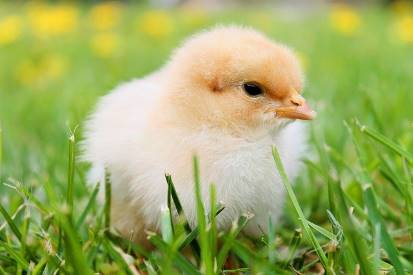
Beyond marigolds, there are several other flowers that can be safely included in a chicken’s diet. However, it is vital to ensure that any plant consumed by chickens is free of pesticides and harmful chemicals. Here, we explore five such flowers – dandelions, poison ivy, comfrey, hibiscus, and carnations.
Dandelions
Dandelions are an excellent choice for chickens, providing a rich source of vitamins A, C, K, and E, as well as calcium and potassium. This yellow wildflower is not only safe but also beneficial for their health. The entire plant – flower, stem, and leaves – can be eaten by chickens, promoting their egg production and overall well-being.
Read More: Can Chickens Eat Dandelions? Unveiling A Golden Feast
Poison Ivy
Despite its common name, poison ivy is not recommended for chickens. While it’s true that some birds can consume this plant without harm, it contains urushiol, a compound that can cause severe allergic reactions in humans and many animals. For safety reasons, it is best to keep your chickens away from poison ivy.
Read More: Can Chickens Eat Poison Ivy? Unraveling The Poultry Paradox
Comfrey
Comfrey is a chicken-friendly plant that can be incorporated into their diet. Known for its high protein content and medicinal properties, comfrey provides beneficial nutrients that can support a chicken’s growth and health. The leaves are particularly palatable to chickens. However, it should be noted that comfrey contains certain alkaloids which can cause liver damage if consumed in excessive quantities. Therefore, it is recommended to provide comfrey in moderation.
Read More: Can Chickens Eat Comfrey? 6 Excellent Benefits
Hibiscus
Hibiscus flowers are safe and nutritious for chickens. They are known for their high vitamin C content and antioxidant properties. In addition, chickens are typically attracted to the bright colors of hibiscus flowers, making them a popular choice. The flowers, leaves, and even the stems of the hibiscus plant can be safely consumed by chickens.
Read More: Can Chickens Eat Hibiscus? Discover Health Benefits & More
Carnations
Carnations are generally safe for chickens to eat, but they don’t hold significant nutritional value. Chickens may peck at these flowers out of curiosity, and in small quantities, they won’t harm your birds. However, carnations have been reported to potentially cause mild gastrointestinal upset in some animals if eaten in large amounts, so they should be offered sparingly.
Read More: Can Chickens Eat Carnations? 5 Awesome Benefits
How to give chickens a healthy and balanced diet
Many people who own chickens don’t realize there is more to feeding them than just throwing some scratch grains on the ground. To keep your chickens healthy and happy, they need a well-rounded and nutritious diet. Here are some tips on how to do that.
What do chickens eat?
Chickens are omnivores, which means that they will eat just about anything. This includes insects, small mammals, lizards, and snakes. In the wild, they will also eat various plants and seeds.
However, their diet is usually much more limited when it comes to domesticated chickens. The most common chicken feed consists of grains like corn or wheat, soybeans, and other legumes.
While chickens can technically survive on a diet of just grain, this isn’t ideal from a health standpoint. A diet like this can lead to health problems like heart disease or liver problems.
That’s why it’s important to supplement your chicken’s diet with other things like fruits and vegetables. Not only will this make them healthier overall, but it will also help them produce richer eggs with brighter yolks.
How much should I feed my chickens?
Generally, you should give your chickens about 1/4 cup of feed daily for every pound they weigh. So, if you have four chickens weighing four pounds, you would give them four cups of feed per day (divided into two meals).
Of course, this is just a guideline – you may need to adjust the amount of feed you give based on how active your chickens are and what else you are giving them to eat throughout the day.
What about treats?
Chickens love treats! Some of their favorites include mealworms, earthworms, crickets, cooked pasta or rice, chopped dark leafy greens like kale or spinach, and small pieces of fruit like grapes or oranges.
Remember that treats should only make up a small portion of their overall diet – no more than 10%, according to most experts. Any more than that, you risk your chickens becoming overweight or developing health problems later in life.
Can chickens eat marigolds – final thoughts
So there you have it – chickens can safely eat marigolds. Not only are they a good source of vitamins and minerals, but they can also help boost your chicken’s immune system and help improve their plumage. Just be sure to give them a few at a time to avoid digestive issues.
So, if you’re looking for a way to add some variety or a boost of nutrients to your chicken’s diet, consider adding marigolds.
Related Articles:
